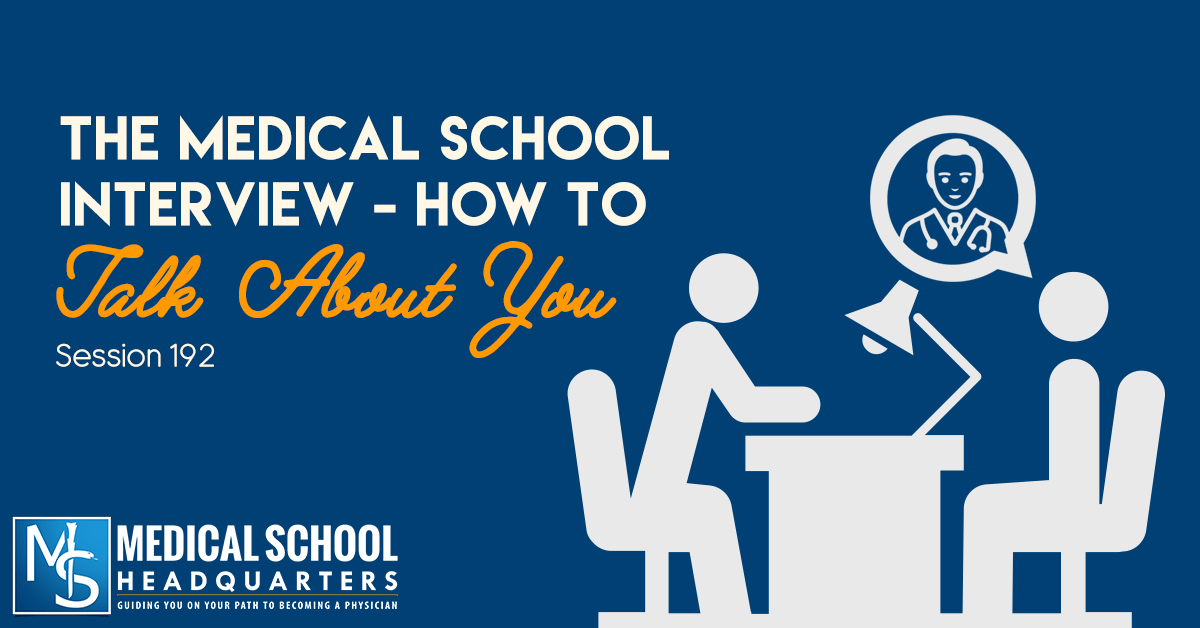Get 20% off a Single 1-on-1 Expert Advising Session Use it for ANYTHING! Learn More!

Today’s episode is another interesting discussion on the medical school interview, particularly about knowing yourself. For most premeds, this is a huge challenge. If you struggling with knowing how to talk about yourself, this is the episode for you.
I’m going to address how you can best come to know yourself, as well as some questions and scenarios you can use as prompts to prepare for your medical school interview.
Listen to this podcast episode with the player above, or keep reading for the highlights and takeaway points.
Know what the highlights are in your life. What are the interesting things about yourself? What do you do for fun, and what are your hobbies? Which places have you traveled to? If someone was trying to make a movie about your life, which scenes would have to be included?
To answer the 'Tell me about yourself' question, you have to know what the highlights are in your life. What are the interesting things about yourself?Click To TweetTry this exercise: Email your family and friends and ask them what they think are your biggest weaknesses.
Be able to talk about abortion and euthanasia. You have to have a side, and you have to understand why you’re taking that side. Be thoughtful about it, and do some soul searching.
[Related episode: Medical Ethics Questions You Can Expect in Your Interview.]
You have about 15 spots for extracurriculars in your application. You need to be able to talk about all of those experiences, as well as the most memorable clinical experience you’ve had.
Ask yourself what questions the interviewer might ask you about the extracurriculars you listed, and think about how you’re going to respond to those. My book about the interview, The Premed Playbook: Guide to the Medical School Interview, includes around 600 different potential interview questions to help get you thinking.
[Check out our Medical School Interview Question Generator for more brainstorming and practice.]
There should always be a lesson learned from each experience you’ve had. So what have been the lessons you’ve learned? Go through your application and make sure you can speak to what lessons you took from each experience.
Have an understanding of what you hope your life will be like years from now. What kind of population do you want to serve as a physician? What kind of setting do you see yourself in?
Come into the medical school interview with an idea of your future as a physician. What kind of a setting do you see yourself practicing in?Click To TweetKnow why you’re sitting in that chair to interview for a spot in next year’s class. Why are you hoping to take a seat from somebody else who might know better why they want to go to that school? Can you cite specific opportunities that are unique to that school or values in their mission statement that you agree with?
Use the MSAR and CIB, along with the schools’ websites, to gather specific data on each school. Be prepared to ask informed questions about details specific to that school.

Lorem ipsum dolor sit amet, consectetur adipiscing elit
I just received my admission to XXXXX! This is unreal and almost feels like I am dreaming. I want to thank you for all of your help with my application. I cannot overstate how influential your guidance and insight have been with this result and I am eternally grateful for your support!
IM SO HAPPY!!!! THANK YOU SO MUCH FOR ALL YOUR HELP, IM INDEBTED TO YOU! Truly, thank you so much for all your help. Thank you doesnt do enough.
I want to take a few moments and thank you for all of your very instructive, kind and consistent feedback and support through my applications and it is your wishes, feedback, and most importantly your blessings that have landed me the acceptance!
I got into XXXXX this morning!!!! It still has not hit me that I will be a doctor now!! Thank you for all your help, your words and motivation have brought me to this point.
I wanted to once again express my heartfelt gratitude for your help in providing feedback during my secondary applications. Your guidance has been instrumental in my journey.
Just wanted to share my wonderful news! I received my first medical school acceptance! Thank you for all that you do for us Application Academy!!!
I am excited to tell you that I just got my third interview invite from XXXXX today! I can’t believe it. I didn’t even know if I was good enough to get one, let alone three – by mid-September. Thank you so much for all of your help and support up to this point; I would not be in this position without it!!
I wanted to thank you for helping me prepare for my XXXXX interview. Even in a 30-minute advising session, I learned so much from you. Thank you for believing in me, and here’s to another potential success story from one of your advisees!
I just received an acceptance with XXXXX! This is so exciting and such a huge relief and so nice to have one of our top choice schools! I also received an interview with XXXXX which brings the total up to 20 interviews! Thank so much, none of this would have been possible without you!

Join our newsletter to stay up to date
* By subscribing you agree to with our Privacy Policy and provide consent to receive updates from our company.
Resources
Advising Services
Podcasts & Youtube
Books
About
"*" indicates required fields